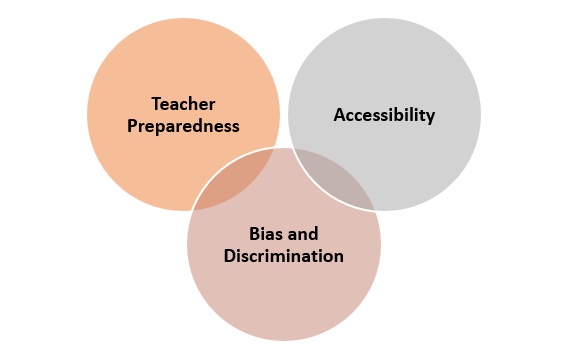Every child deserves access to quality education, regardless of their physical, cognitive, linguistic, or socio-economic background. Inclusive education is more than a policy—it's a commitment to equity, dignity, and opportunity for all learners. As an educator, you have the power to change this narrative. Pursuing an online Master of Education with a focus on inclusive education equips you with the skills and knowledge to create learning environments that support diverse learners.
According to UNESCO’s 2020 Global Education Monitoring Report, 40% of the poorest countries failed to support learners with disabilities during the COVID-19 crisis. Even in developed countries, systemic biases, lack of trained teachers, and inadequate resources prevent many students from fully participating in mainstream education.
This blog explores the current landscape of inclusive education and how an M.Ed. can empower you to make a meaningful impact.
The Global Landscape of Inclusive Education
Inclusive education is ingrained in the belief that schools should accommodate all learners, regardless of their differences. It’s supported by international frameworks like:
- The UN Convention on the Rights of Persons with Disabilities (CRPD), which emphasizes inclusive education as a human right.
- Sustainable Development Goal 4 (SDG 4), which aims to "ensure inclusive and equitable quality education and promote lifelong learning opportunities for all" by 2030.
Despite these efforts, major challenges remain:

The need for well-trained, compassionate educators is universal—and urgent.
How an M.Ed. Empowers You to Support Diverse Learners?
An M.Ed. with a specialization in inclusive education covers a varied range of learner needs, including:
- Cognitive and intellectual disabilities
- Autism spectrum disorders
- Emotional and behavioral differences
- Language barriers and multilingual learners
- Socio-economic disadvantages
- Gifted and talented education
You'll gain skills in creating Individualized Education Programs (IEPs), employing segregated teaching, and using evidence-based teaching strategies tailored to every student's strengths.
Example: In Canada and the U.K., differentiated instruction is a core requirement for inclusive classrooms, ensuring students of varying abilities succeed together.
An M.Ed. program trains you to:
- Offer multiple ways for students to access content (e.g., audio, visual, tactile).
- Provide varied opportunities for learners to demonstrate what they know.
- Foster engagement by tapping into different interests, challenges, and motivations.
Culturally Responsive Teaching
Inclusive education isn't only about infirmities—it also includes respecting and incorporating cultural, linguistic, and socio-economic diversity.
M.Ed. programs help teachers develop culturally responsive teaching practices, such as:
- Valuing diverse cultural knowledge and traditions.
- Integrating students' home languages and experiences into learning.
- Confronting and mitigating biases in classroom interactions.
Leadership and Advocacy for Inclusive Practices
An M.Ed. isn't just about what happens inside the classroom—it also prepares you to advocate for broader systemic change.
Graduates are trained to:
- Influence policy development at local, national, or international levels.
- Lead professional development initiatives on inclusive practices.
- Foster partnerships between schools, families, and communities.
Real-world impact: In the U.S., teachers with graduate degrees are twice as likely to serve in leadership roles promoting inclusive education policies (National Center for Education Statistics, 2022).
To End With
Inclusive education is not just a right—it's a collective responsibility. Every child deserves an education system that sees their potential and nurtures it. By earning an online M.Ed. with a focus on inclusive education, you position yourself not only as an exceptional educator but also as a changemaker in a world that urgently needs compassionate, informed leadership.
Inclusive education starts with you. Your passion, your skills, and your decision to specialize can create learning spaces where everyone belongs—and everyone flourishes.
Written By : Christina B.




